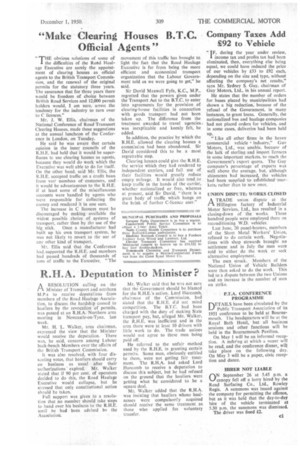"Make Clearing Houses Official Agents"
Page 43

If you've noticed an error in this article please click here to report it so we can fix it.
" THE obvious solutions of some of the difficulties of the Road Haulage Executive are surely the appointment of clearing houses as official agents to the British Transport Commission, and the renewal of the original permits for the statutory three years. The assurance that for three years there would be freedom of choice between British Road Services and 12,000 permit holders would. I am sure, arrest the tendency for the industry to turn over to C licences."
Mr. J. W. Ellis, chairman of the National Conference of Road Transport Clearing Houses, made these suggestions at the annual luncheon of the Conference in London, on Tuesday.
He said he was aware that certain opinion in the inner councils of the R.H.E. had held that it would be superfluous to use clearing houses as agents, because they would do work which the Executive was well able to do for itself. On the other hand, said Mr. Ellis. the R.H.E. accepted traffic on a credit basis from vas numbers of customers, and it would be advantageous to the R.H.E. if at least some of the miscellaneous accounts were handled by agents who were responsible for collecting the money and rendered it in one sum.
The increase in C licences must be discouraged by making available the widest possible choice of systems of transport, rather than by the use of the big stick. Once a manufacturer had built up his own transport system, he was not likely to revert to the use of any other kind of transport.
Mr. Ellis said that the Conference had.supported the R.H.E. and members had passed hundreds of thousands of tons of traffic to the Executive. "The movement of this traffic has brought to light the fact that the Road Haulage Executive is far from being the more efficient and economical transport organization that the Labour Government told us we were going to get," he said.
Sir David Maxwell Fyfe, K.C., M.P., regretted that the powers given under the Transport Act to the B.T.C. to enter into agreements for the provision of clearing-house facilities in connection with goods transport had not been taken up. The difference from the treatment awarded to travel agencies, was inexplicable and keenly felt, he added.
In addition, the practice by which the R.H.E. allowed the clearing houses a commission had been abandoned. Sir David considered this to be a most regrettable step.
Clearing houses could give the R.H.E. the service which they had rendered to independent carriers, and full use of their facilities would greatly reduce empty mileage. It would also tend to keep traffic in the hands of the carrier, whether nationalized or free, whereas at present, said Sir David, " there is a great body of traffic which hangs on the brink of further C-licence user."












































































































